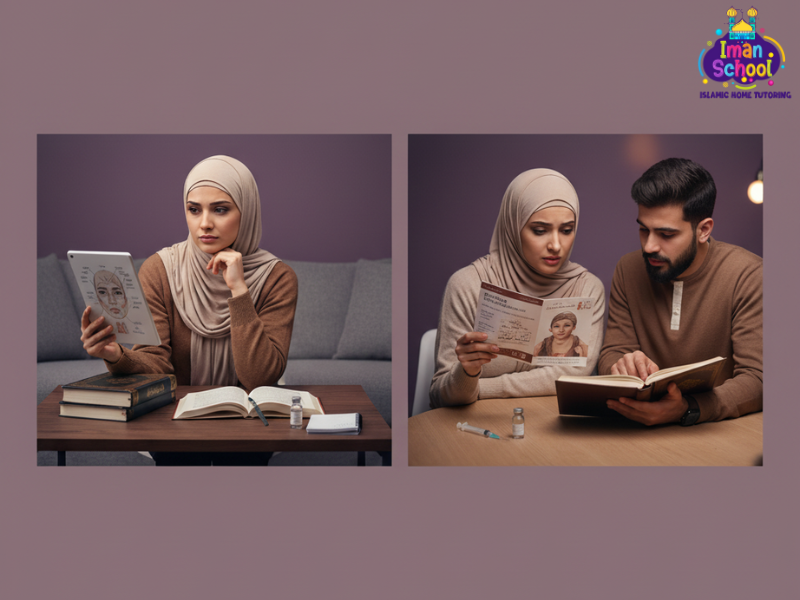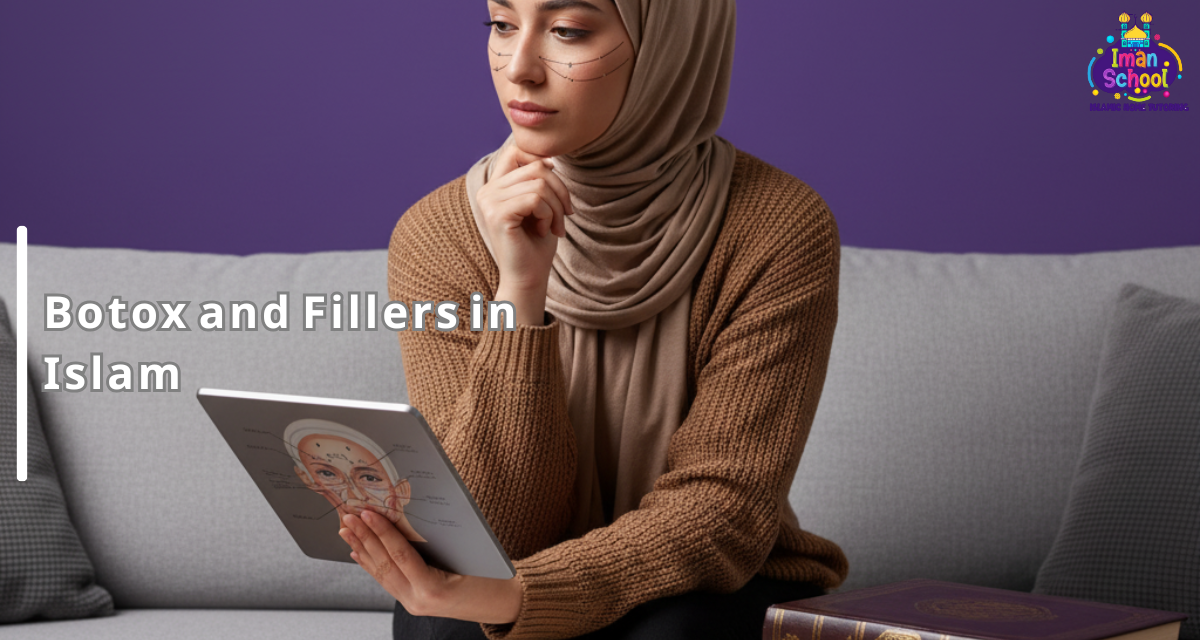Botox and Fillers in Islam have become a widely discussed topic as cosmetic enhancements gain popularity worldwide. Many Muslims today wonder about the Islamic ruling on Botox and fillers. This is not only a matter of aesthetics but also of faith, as it relates to key Islamic principles of modesty, preservation of divine creation, and the pursuit of beauty in a permissible way. In this article, we provide a clear, evidence-based guide to understanding this issue through the Quran, Sunnah, and scholarly opinions.
What Does Islam Say About Changing Your Appearance?
Islam does not prohibit seeking beauty or looking after one's appearance. The Prophet Muhammad (peace be upon him) said, "Allah is beautiful and loves beauty." However, Islam draws a clear line between permissible forms of adornment and those that involve altering Allah's creation for vanity.
This is a fundamental concept in the Islamic perspective on plastic surgery and other cosmetic procedures. The distinction lies between a procedure that restores a physical defect and one that is purely for cosmetic enhancement. This is the essence of Islam and beauty.

Is Botox Haram? An Islamic Ruling
The ruling on Botox in Islam is a subject of scholarly debate, with two main viewpoints. There is no single, unanimous Islamic fatwa on botox, so it is crucial to understand the reasoning behind each position.
The Prohibitory View
This opinion, held by many scholars, states that the use of Botox for cosmetic reasons is haram (forbidden). This view is based on the principle of changing Allah's creation for the sake of vanity. They argue that although the procedure is not permanent, its purpose is to alter one's natural appearance, which falls under the category of non-permissible procedures.
The Permissible View
This opinion, held by other scholars, states that Botox is permissible under certain conditions. They argue that because the effects are temporary and the procedure does not permanently alter the physical structure of the body, it is akin to using temporary adornment like makeup or henna. This view distinguishes it from permanent procedures like a nose job, which are generally considered forbidden for cosmetic reasons.
The general consensus among the more cautious scholars is that any procedure done for mere beautification and not to correct a defect is better to be avoided. This is a key part of the Fiqh of cosmetics.
Explore: Fiqh Course
The Difference Between Botox and Fillers in Islam
To understand the rulings, it is important to know the difference between the two.
Botox (botulinum toxin) is a neurotoxin used to temporarily paralyze muscles, primarily to reduce the appearance of dynamic wrinkles (those caused by muscle movement).
Fillers, on the other hand, are substances injected into the skin to add volume, plump up areas like lips or cheeks, and fill static wrinkles. Both are common cosmetic procedures in Islam for those seeking a more youthful appearance.
Botox for Medical vs. Cosmetic Use: An Islamic Perspective
This is where the ruling becomes clearer. There is a near-unanimous scholarly consensus that Botox for medical reasons Islam is permissible. This is because it is not done for the purpose of altering creation but to treat a disease or a physical ailment. Examples include using Botox to treat severe migraines, muscle spasms, or excessive sweating. In such cases, the procedure falls under the category of medical treatment, which is highly encouraged in Islam.
Fiqh of Cosmetic Surgery: When is it Permissible?
The broader Fiqh of cosmetic surgery states a clear distinction. A procedure is permissible if it is done to correct a defect or to restore a normal appearance caused by an accident, disease, or birth defect. For example, plastic surgery to fix a disfiguring scar, a severe burn, or a cleft lip is permissible. This is because the intention is to restore the body to a natural state and remove harm, not to alter its natural form.
However, a procedure done purely for beautification and without a genuine need, such as an Islamic ruling on nose job for cosmetic reasons, is considered haram. This distinction is crucial to understanding the permissibility of any cosmetic procedure.
The Principle of 'Changing Allah's Creation' (Taghyeer Khalqillah)
This is the core principle that governs the prohibition of cosmetic procedures for vanity. The Quran mentions this in the context of Satan's deception:
"And I will surely mislead them and will surely arouse in them [sinful] desires, and I will surely order them to slit the ears of cattle, and I will surely order them to change the creation of Allah." (Quran, 4:119)
Furthermore, the Prophet Muhammad (peace be upon him) cursed women who engaged in certain cosmetic alterations. A famous Hadith on changing creation from Sahih al-Bukhari and Muslim states:
"The Prophet (peace be upon him) cursed the women who get tattoos and the women who have them done, and the women who pluck eyebrows and the women who have their eyebrows plucked, and the women who file their teeth for the purpose of beautification and change the creation of Allah."
This Hadith on changing creation is the primary textual evidence for the prohibition of altering one's body for vanity, which also applies to is tattooing haram and other permanent cosmetic alterations.
Botox for Wrinkles: What Do Islamic Scholars Say?
The Islamic fatwa on botox for wrinkles is a nuanced issue. As mentioned, there are two views. The scholars who permit it view the temporary nature of the procedure as a key distinction. The ones who prohibit it argue that since the sole purpose is to alter the natural aging process for vanity, it falls under the principle of changing Allah's creation.
The consensus among the majority of classical scholars and many contemporary ones leans towards caution, viewing it as a practice that is at best disliked and at worst forbidden for non-essential use.

The Ruling on Fillers to Plump Lips or Cheeks
The ruling on is fillers haram is subject to the same scholarly debate as Botox. The argument for permissibility is based on the temporary nature of the filler and its use for adornment. The argument for prohibition is based on the notion that plumping lips or cheeks is an act of changing one's natural form for pure cosmetic reasons, a practice that falls under the category of actions discouraged in the Hadith on changing creation.
Questions to Ask Yourself
Given the lack of a single, unanimous ruling, it is essential for a Muslim to make an informed decision based on the available evidence. Before getting Botox and Fillers in Islam, ask yourself these questions:
-
Is this procedure for a medical reason or to correct a genuine physical defect?
-
Am I doing this to remove a disfigurement or purely for vanity and enhancement?
-
Is the procedure a temporary form of permissible beauty in Islam or a permanent alteration?
-
Am I doing this to compete with others or due to a lack of contentment with myself?
-
Does this procedure violate the principle of changing Allah's creation?
This self-reflection is an essential part of Islamic guidance on beauty and navigating modern Islamic issues.
Related Articles
- Body Piercings Islamic Ruling
- Laser hair removal Islamic ruling
- Fake nails Islamic ruling
- Islamic ruling on tattoos
- Islamic Ruling on Eyebrows
FAQ about Botox and Fillers in Islam
What is the main Islamic ruling on Botox and Fillers in Islam?
The Islamic ruling depends on the purpose. If it's for medical reasons (like treating a disease or correcting a deformity), it's permissible. If it's for purely cosmetic reasons to change one's appearance for vanity, most scholars consider it forbidden due to the principle of changing Allah's creation.
Is a nose job or other cosmetic surgery haram (forbidden) in Islam?
Yes, generally it is. The Fiqh of cosmetic surgery makes a clear distinction: if the surgery is to fix a defect or an injury, it is permissible. However, an elective surgery like a nose job done purely for beautification is considered is cosmetic surgery haram because it involves permanently changing Allah's creation.
Is Botox for wrinkles considered haram?
This is a point of scholarly difference. Some scholars say yes, it's haram because its purpose is to alter one's appearance for vanity. Others say it's permissible because the effect is temporary, similar to makeup. However, the more cautious view is to avoid it.
Do fillers have the same ruling as Botox?
The ruling for fillers in Islam is similar to Botox. The debate centers on whether the temporary nature of the filler makes it permissible. But just like Botox, if its sole purpose is to alter one's appearance for vanity, many scholars consider it forbidden.
What is the key principle behind the rulings on Botox and Fillers in Islam?
The key principle is changing Allah's creation for no valid reason. The Prophet (PBUH) warned against practices like tattooing and filing teeth for beautification, which serve as a basis for the ruling on permanent and non-medical cosmetic procedures.
Explore Our Online Courses on Islamic Fiqh and Contemporary Issues
Iman School provides comprehensive online courses on Islamic Fiqh and contemporary issues. Our curriculum is designed to help you understand the principles of Islam and apply them to your daily life. Our certified scholars provide clear guidance, so you can make decisions based on sound knowledge, not just popular opinion.
The rulings on Botox and Fillers in Islam are just one example of the many complex modern Islamic issues that require a deep understanding of Fiqh. For a clear, evidence-based approach to such topics, a structured Islamic education is invaluable.




